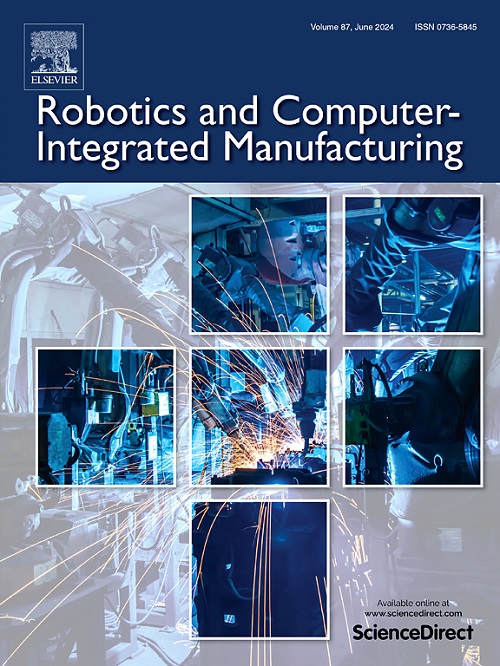Adaptive robotic polishing based on distributed flexible force sensors
IF 9.1
1区 计算机科学
Q1 COMPUTER SCIENCE, INTERDISCIPLINARY APPLICATIONS
引用次数: 0
Abstract
Force control plays a critical role in the robotic polishing process. Traditional force control methods primarily emphasize regulating the precise contact force value while paying limited attention to the distribution of force within the contact surface. Drawing inspiration from manual polishing techniques that employ tactile sensing, this study introduces an innovative robotic adaptive polishing system incorporating distributed flexible sensors. The experimental platform was developed based on robot and distributed flexible sensor to measure distributed contact force, and a force value and distribution state tracking control strategy is introduced to achieve stable and desired contact force value along with uniform force distribution state. The system's efficacy was rigorously evaluated through both virtual simulations and experimental validations, which confirmed its superior tracking performance. Comparative machining experiments further substantiated that the proposed strategy significantly enhances surface quality consistency over traditional methods. This approach has significant potential for further development, particularly in robotic polishing or other force control applications involving contact areas.
基于分布式柔性力传感器的自适应机器人抛光
力控制在机器人抛光过程中起着至关重要的作用。传统的力控制方法主要强调调节精确的接触力值,而对接触面内力的分布关注有限。从采用触觉感知的手工抛光技术中汲取灵感,本研究介绍了一种采用分布式柔性传感器的创新机器人自适应抛光系统。建立了基于机器人和分布式柔性传感器的分布式接触力测量实验平台,并引入了力值和分布状态跟踪控制策略,实现了稳定理想的接触力值和均匀的力分布状态。通过虚拟仿真和实验验证,对系统的有效性进行了严格的评估,验证了其优越的跟踪性能。对比加工实验进一步证实了该策略较传统方法显著提高了表面质量一致性。这种方法具有进一步发展的巨大潜力,特别是在机器人抛光或其他涉及接触区域的力控制应用中。
本文章由计算机程序翻译,如有差异,请以英文原文为准。
求助全文
约1分钟内获得全文
求助全文
来源期刊
CiteScore
24.10
自引率
13.50%
发文量
160
审稿时长
50 days
期刊介绍:
The journal, Robotics and Computer-Integrated Manufacturing, focuses on sharing research applications that contribute to the development of new or enhanced robotics, manufacturing technologies, and innovative manufacturing strategies that are relevant to industry. Papers that combine theory and experimental validation are preferred, while review papers on current robotics and manufacturing issues are also considered. However, papers on traditional machining processes, modeling and simulation, supply chain management, and resource optimization are generally not within the scope of the journal, as there are more appropriate journals for these topics. Similarly, papers that are overly theoretical or mathematical will be directed to other suitable journals. The journal welcomes original papers in areas such as industrial robotics, human-robot collaboration in manufacturing, cloud-based manufacturing, cyber-physical production systems, big data analytics in manufacturing, smart mechatronics, machine learning, adaptive and sustainable manufacturing, and other fields involving unique manufacturing technologies.

 求助内容:
求助内容: 应助结果提醒方式:
应助结果提醒方式:


